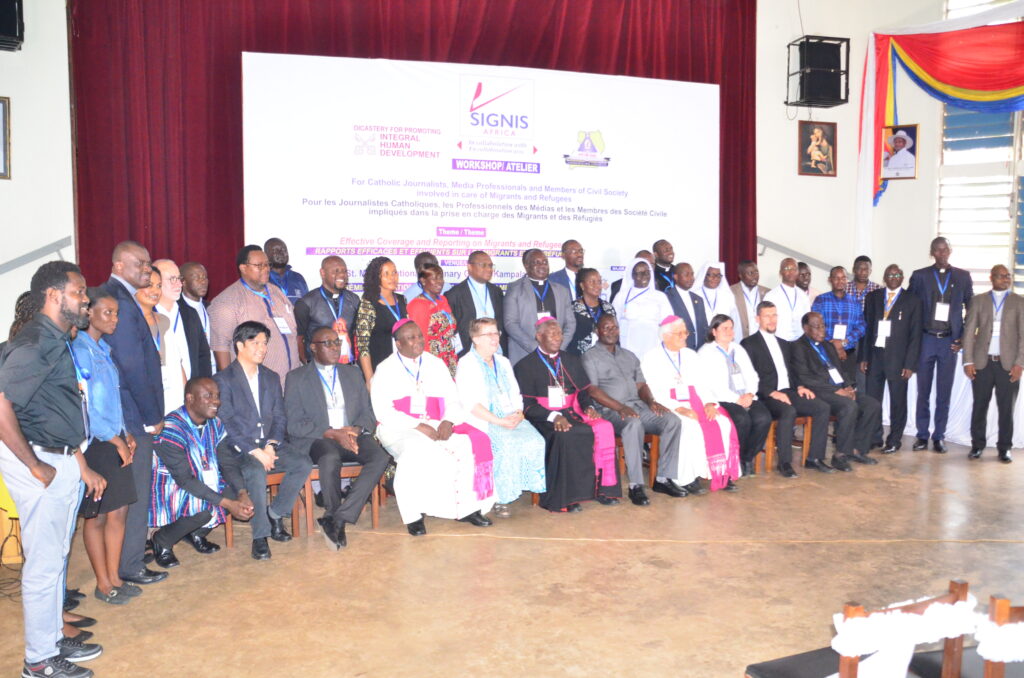VATICAN: Insists Catholic Journalists to Share Relevant Information about Migrants and Refugees

Sarah Pelaji
The Dicastery for Communication Vatican has insisted that Catholic journalists from various media must show practical solidarity with migrants and refugees by reporting on issues within the world’s public sphere.
This was said by the Prefect of the Dicastery for Communication Vatican Paolo Ruffini during the workshop for Catholic Journalists, media Professionals and Members of Civil Society involved in the of Migrants and Refugees which was held from 10th-15th July 2023at St. Mary’s National Seminary Ggaba, Kampala, Uganda.
The Workshop was organized by the Assosiation of Catholic Communicators -SIGNIS Africa – in collaboration with the Vatican’s Dicastery for Promoting Integral Human Development.
Under the theme ‘Effective Coverage and Reporting on Migrants and Refugees’, in his speech that was presented by the Vice President of SIGNIS Fr Paul Samasumo, Dr Ruffini insisted media to build bridges and break down walls working toward social cohesion.
He said that Pope Francis wants to shake the world’s consciences so that people reflect towards a concrete change of heart.
He appreciated Uganda being the land of African martyrs which is also well-known for being a model refugee-hosting country. As thousands of desperate men, women and children flee conflicts and natural disasters in search of a place of refuge, Uganda has always opened its doors to welcome record numbers of our brothers and sisters.
So, the topic chosen is of substantial interest for the training not only for the African continent but also for the future of humanity at large.
He insisted that journalist must be guided by the Gospel values and see the reality of others with the eyes of the heart, listening with the ears of the heart and, above all, speak with the heart, with capability of empathy and true compassion.
“I trust that your continental efforts to share in the synodal process which is pushing us as a Catholic Church to weave more communion by lighting hearts, and caring for each other’s wounds will bear much fruit.
We count on your work to strengthen the link between Rome and the local Churches,” he said.
It was also stated that Catholic media are obliged to share more stories of the marginalized and discarded society with which puts the relationship with God and one’s neighbor.
These include all who are suffering, asylum-seekers, climate-displaced people, internally displaced people (IDPs), and victims of human trafficking. African church narratives may help in shining light on our common journey.
Sharing stories, relevant information and also projecting within the world’s public sphere, issues which can mitigate the plights of the vulnerable persons, is a most practical solidarity witness in our Church.
“We need media that build bridges and break down walls, working toward social cohesion. May this workshop contribute to building a different way of making information and generate more interrelationship for a sense of more responsibility among all communication stakeholders so that they may carry out their profession as a mission.
May the workshop help each one of you to rediscover the potential of SIGNIS to be a network that unites, a network woven of truth and beauty, faith and hope,” he stated while adding;
“In his recent message for the 57th World Communications day, Pope Francis invites us to purify our hearts in order to communicate truth with charity, to focus on “speaking with the heart”, radically challenging the inclination of our generation towards indifference and indignation, at times even on the basis of disinformation which falsifies and exploits the truth.”
He wanted the workshop to come up with guidelines which will concern and interest journalists from the secular media for more humane reporting on people already distressed by difficulties and Suffering.
On her part, the President of SIGNIS Dr Helen Osman said that the mission of the association is to transform cultures in the light of the Gospel by promoting human dignity, justice and reconciliation.
She underscored that journalist go beyond reporting news by putting flesh on the data, especially the images of the people suffering.” We must tell the story of our brothers and sisters,” she insisted.
The President of CEPACS Rt. Rev. Emmanuel Badejo explained that the training has come after studies have shown that there has been a lack of information on immigrants and refugees in the media which is expected to reveal various information about immigrants and refugees, especially the real situation of their lives, their challenges and benefits in various countries in Africa and Madagascar.
He has said there have been misinformation about immigrants and refugees that have been negative in society, especially on social networks and the media of developed countries.
He has asked the Church, government and society to have a positive attitude towards refugees and immigrants by cooperating with journalists to know in detail the life and benefits of the presence of migrants and refugees.
“There is no country in the world built by only natives. Immigrants have built and raised the economy of various countries in the world, the important thing is to follow the rules and laws of refugees and immigrants, to give them respect and various economic opportunities such as using their talents, giving them jobs, education, agricultural areas, etc. To continue building the local economy.
If we use them well, they get jobs, they do business, they will raise agriculture and benefit our nations with their talents, we increase the number of tax payers and grow the economy,” he emphasized.


